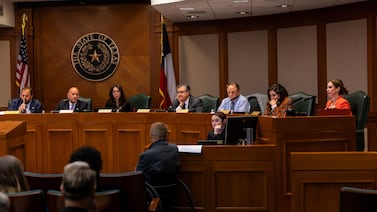A version of this post was originally distributed in Votebeat’s weekly newsletter. Sign up here.
Hi, y’all,
On the eve of the election, True the Vote, one of the main groups promoting questions about election integrity, seems to be stepping in it all over the country. As you might have seen, there have been things happening in the Houston federal courtroom where the group has been accused of computer crimes and defamation. Catherine Engelbrecht, the group’s leader, and Gregg Phillips, a contractor and former board member, were escorted to jail — in contempt of court for refusing to give up the name of a man they say is a “confidential informant.” [Update: Nov. 7: An appeals court has released Engelbrecht and Phillips from jail.]
But that is not all, folks.
A voter in Georgia who dropped off ballots for himself, his wife, and his three adult children has now sued the group. The man and his family live at the same address, and Georgia law allows such ballot delivery. An investigation found he’d done nothing wrong. Still, his face — sometimes blurred and sometimes not — and his visible license plate was shown in “2000 Mules” trailers. In the documentary itself, Engelbrecht, Phillips, and conservative commentator Dinesh D’Souza, their partner in the project, openly accuse the man of criminal behavior.
“What you are seeing is a crime. These are fraudulent votes,” D’Souza says, as the man is shown casting the ballots at a drop box in downtown Lawrenceville, northeast of Atlanta.
The man, Mark Andrews, said the lies have resulted in harassment and anxiety over casting ballots in the future.
“At all times, Defendants knew that their portrayals of Mr. Andrews were lies, as was the entire narrative of 2000 Mules,” the lawsuit says. “But they have continued to peddle these lies in order to enrich themselves.”
As well, in Arizona, an investigator in the state attorney general office’s has recommended the group be investigated for raising money off of apparently false claims that the group had evidence of similar “mules” in Arizona. Despite repeated requests, the group never offered any such proof to the state or the federal government.
“TTV has raised considerable sums of money alleging they had evidence of widespread voter fraud,” wrote Reginald Grigsby, an investigator with the state attorney general’s office. “It would appear that further review of its financials may be warranted.”
The book D’Souza penned to go alongside the “2000 Mules” movie was, this fall, suddenly held from shelves so the publisher could soften accusations of crimes against named nonprofits. It was a significant step. D’Souza openly told fans in a July tweet he was “going to reveal the names of several” such groups in his book. The move appears to be designed to prevent future lawsuits of the type filed in Georgia. NPR nonetheless obtained a copy of the original version of the book and reached out to the named groups, which, among other things, called the accusations “trash” and threatened legal action.
On this, Engelbrecht and Phillips have washed their hands. “True the Vote had no participation in this book, and has no knowledge of its contents,” the group said in a statement to NPR back in September. “This includes any allegations of activities of any specific organizations made in the book. We made no such allegations.”
Still, it’s a lot for one group of people to be dealing with at once.
Even if True the Vote ultimately escapes responsibility for the book, its leaders are, as of Friday evening, still sitting in jail and facing two serious defamation lawsuits. Arizona is far from the only state the group used dubious claims to raise money in, and it might not be the only state to float an investigation. The group has also been integral to efforts organizing drop box monitoring in Arizona, activity which state officials and the U.S. Department of Justice have already voiced concerns about, and a federal judge recently issued a restraining order limiting.
If you’ve been following the careers of Phillips and Engelbrecht, you’ll find that getting themselves into messes has been a decades-long endeavor.
Phillips has been fired from multiple state jobs in multiple states, largely for self dealing. At one point, he owed as much as $100,000 in unpaid taxes. Nonprofit news organization Reveal has also extensively reported on the money flowing from True the Vote to organizations associated with Phillps and Engelbrecht. Engelbrecht has also received personal loans directly from True the Vote.
In 2017, True the Vote became Trump’s go-to expert as he repeatedly claimed the popular vote had been robbed from him due to fraud. “Gregg Phillips and crew say at least 3,000,000 votes were illegal. We must do better!” Trump tweeted in late January 2017. Engelbrecht and Phillips enthusiastically raised money after the tweet, saying their research would cost at least $1 million. But in a video posted in June of that year, Engelbrecht said they were unable to complete the work because they hadn’t raised enough money. No data was ever released.
In late 2020, a donor who’d given True the Vote $2.5 million sued the group for the return of his money. The donor said he’d given it because True the Vote promised to file lawsuits across the country, as they’d collected hard evidence of voter fraud. True the Vote ultimately offered no such proof and dropped all of the lawsuits, later privately blaming the Trump campaign for misleading them about the quality of the evidence.
So I suppose the shocking thing is not that True the Vote has, again, found itself in an ever-filling pit of its own problems, but that it has taken this long for all of the various problems to mount.
Now, the courts are pushing True the Vote to substantiate its claims or stop making them, and the group is facing real accountability for its disinformation campaigns. But we’re on the eve of an election, amidst growing fears that unfounded charges of election fraud could lead to violence or other voting disruptions. What happens next, both in the election and the defamation case, could shape the battle against election misinformation going forward.
Sometimes groups like True the Vote get themselves into so much trouble it’s tempting to write them off. While it seems like TTV may have crossed the rubicon, I would urge you to pay attention for a little while longer. The case in Texas, the one in Georgia, and the potential investigations elsewhere may just be the beginning.
Heads up: Needless to say, with Election Day on Tuesday, next week is a big one for our country and for Votebeat. You’ll receive a few more email updates from us next week than usual. Expect us in your inbox with election coverage updates and in-depth nuanced reporting before next Saturday.
The voting landscape
Last week, in either a moment of prescience or a moment of weakness depending on how things shake out in the next three days or so, I wrote that I feared this year might be the year when trouble actually does go down at the polls. Let’s check my progress.
Lots of voting is happening. As a whole, the number of ballots cast are on track to outpace the last midterm election. Still, voting looks differently than it did then. Ballots might be up, but people walking into the polls on Election Day itself will likely be way down given the increased likelihood of voting early or by mail. Turnout is down where apathy is up: Texas, Virginia, Tennessee, to name a few. A few, like Georgia and Maine, are seeing record turnout.
Things are also much the same as they were in 2020: Voters are sticking to pandemic-era voting habits, even as in-person voting is widely available. And — much like two years ago — Republicans have low confidence in the election process. There continues to be a partisan split in the way Republicans and Democrats participate, with more Democrats voting early and by mail. This may, again, result in perhaps even more of a dramatic red mirage than what we saw in 2020, as mailed ballots take longer to count than those cast in person at a precinct.
Finally, there has been a lot of focus on voter intimidation. It’s important to keep in mind that even where things are not great (like in Arizona, where a judge has recently slapped down a few dozen protesters who’d positioned themselves at a small number of drop boxes in the state, limiting their actions and demanding they correct false statements on their social media), the incidents are currently isolated. In other places that have been hotspots for misinformation, like Shasta County, California, activists are also hassling voters while going door to door. But these problems were expected, and voters should take comfort that election workers have made extra preparations to protect voters and workers.
New From Votebeat
When polls close at 8 p.m. on Election Day, a nearly three-week process to finalize and certify results will begin, a period in which candidates could lodge objections to certain votes and spark protracted legal fights that would draw out a normally routine process, Carter Walker reports for Votebeat Pennsylvania. Many fair elections advocates in Pennsylvania anticipate challenges in this year’s contests, and say results certification and the handling of undated mail-in ballots are particular issues to watch.
In 2020, voters in Apache County, which includes much of the Navajo Nation, saw a higher percentage of provisional ballots rejected than other counties in the state. Navajo Nation officials have been lobbying Apache County for a solution already adopted by many other Arizona counties — opening at least one vote center on the reservation where registered voters from anywhere in the county would be allowed to cast ballots. But they say they haven’t been able to persuade local election officials, despite offering resources to support the vote center, Jen Fifield and Carrie Levine report for Votebeat Arizona.
Michigan lawmakers are allowing clerks two days to pre-process absentee ballots, but many clerks, especially in smaller municipalities, say that’s not enough time to be worth the effort, Oralandar Brand-Williams reports for Votebeat Michigan. It’s mainly big cities, including Grand Rapids and Detroit, taking advantage of the new law.
True the Vote leaders Catherine Engelbrecht and Gregg Phillips were held in jail on contempt of court Monday after refusing to release the name of a person of interest in the defamation case against them, Jessica Huseman reports for Votebeat Texas. That followed a chaotic hearing last week, when they were declared in contempt.
In Other Voting News
Election officials should not count undated mail ballots, according to a ruling from a divided Pennsylvania Supreme Court, Spotlight PA reports. The court deadlocked over whether failing to count the undated or misdated mail ballots would violate federal civil rights laws, and instructed election officials to keep the ballots separate from others, a sign more litigation is possible.
One North Carolina election administrator has faced down conservative pressure, including attempts to access Surry County’s voting machines and cut her salary. ProPublica took a deep dive into her challenges.
A federal judge in Arizona issued a temporary restraining order against Clean Elections USA, an organization organizing volunteers to monitor drop boxes, barring them from following voters from a drop box, verbally engaging with voters, posting photos or videos of the boxes online, openly carrying or wearing body armor, and spreading misinformation, the Arizona Mirror reports. (Read Votebeat Arizona’s reporting on the forces promoting the drop box monitoring program.)
Lawyer John Eastman and other Trump allies saw intervention by Supreme Court Justice Clarence Thomas as the best route to overturn the 2020 presidential election, new emails obtained by Politico show.
Law enforcement and election officials are warning against any attempt to intimidate voters, and are preemptively speaking out against what they see as efforts to circulate misinformation or target those casting ballots, the New York Times reports. And Reuters reports on how Republican door-knockers searching for voter fraud are intimidating people.
More than 100 state and local election jurisdictions are on a waitlist for risk and vulnerability assessments to be performed by the U.S. Department of Homeland Security’s Cybersecurity and Infrastructure Agency, which is backlogged, NBC News reports.
Jessica Huseman is Votebeat’s editorial director and is based in Dallas. Contact Jessica at jhuseman@votebeat.org.






